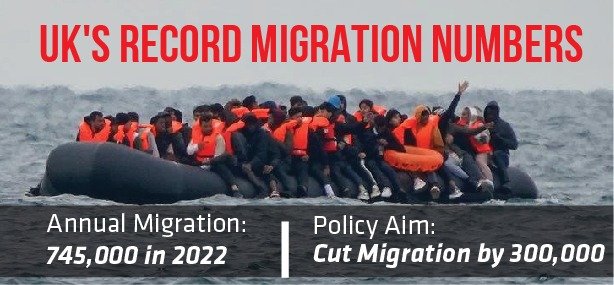A set of initiatives aimed at reducing net migration to the United Kingdom, which involves increasing the minimum salary criteria for foreign workers to qualify for a work visa.
In a decisive move aimed at curbing the surge of migrants, the United Kingdom unveiled its intentions to reduce the influx of migrants through legal channels, announcing an increase in the minimum salary requirement for skilled jobs by one-third. This move comes in response to mounting pressure on UK’s Prime Minister Rishi Sunak to address the unprecedented levels of net migration.
You can Also Read: US Navy Ship Trespasses in South China Sea: Sparks Tension
Legal migration has been a prominent issue in British politics for over a decade, playing a significant role in the 2016 decision to exit the European Union. With an upcoming election on the horizon and the Labour Party leading in polls, Prime Minister Sunak aims to assert more control, responding to criticisms from within his Conservative Party.
However, both businesses and trade unions criticized the measures, labeling them counterproductive and burdensome for both the private sector and the state-run health service, both grappling with labor shortages.
What Happened on 23 June 2016?
The discourse on immigration sparked discussions about border control, EU freedom of movement, and the perceived impact of migration on the economy and society. Economic considerations also played a significant role, with debates centering on trade policies, market protocols, and the pros and cons of EU membership on Britain’s economy. Sovereignty became a crucial factor, focusing on recovering national autonomy from EU institutions.
These debates concluded in the historic 2016 referendum, where the majority voted to leave the EU. This decision reshaped Britain’s political trajectory and had repercussions across Europe and globally.

UK’s Record Migration Numbers Announced
United Kingdom’s recent statistics revealed a record annual net migration of 745,000 in 2022, maintaining high levels, with a notable shift in the origin of migrants from the EU to countries such as India, Nigeria, and China.
Home Secretary James Cleverly suggested that the newly introduced measures could potentially reduce the migration figure by 300,000. Sunak emphasized the need for drastic action, stating, “Immigration is too high. Today we’re taking radical action to bring it down.” Additionally, efforts are underway to deport migrants arriving illegally to Rwanda.
Among the specific measures, the government plans to raise the minimum salary threshold for foreign skilled workers from £26,200 to £38,700, excluding health and social workers. Other measures include prohibiting foreign health workers from bringing in family members on their visas, a 66% increase in the surcharge migrants pay for using the health service, and an elevation of the minimum income for family visas.
However, concerns have emerged over the potential ramifications of these measures. Business owners express apprehension, foreseeing difficulties in hiring amid the persistently tight labor market, exacerbated by the end of free movement from the EU post-Brexit.
Disputes and the Future Landscape
Disputes loom as the government considers abolishing the shortage occupations list, a critical avenue for businesses to recruit migrant workers in sectors experiencing severe staff shortages. Britain’s Home Secretary James Cleverly also announced the discontinuation of paying migrants 80% of the going rate for jobs facing worker shortages, signaling a revamp of the occupation list.
Yet, studies questioning the impact of foreign workers on overall wage or employment levels cast doubt on the efficacy of these measures. The acute shortage of candidates to fill vacancies remains a pressing issue for many businesses, particularly in the hospitality sector.
“We will stop immigration undercutting the salary of British workers, we will create a new immigration salary list with a reduced number of occupations,”Cleverly told lawmakers.
Trade unions echo concerns about the implications of these changes, fearing adverse effects on sectors like health services and pointing out the potential exodus of migrants to more welcoming countries.
As the UK charts this path of stringent immigration measures, the delicate balance between regulating migration and meeting labor market demands remains a focal point of contention and debate.
“These adjustments will narrow the talent pool available to the entire economy for recruitment, exacerbating the already critical shortages faced by hospitality businesses,”said Kate Nicholls, chief executive of trade body UK Hospitality.

Insight into UK Immigration Trends: 2021-2022
Between June 2021 and 2022, a distinctive shift in global mobility unfolded. As nations eased COVID-19 restrictions, international movement surged, notably impacting the UK. The Office for National Statistics (ONS) highlighted an unprecedented trend: a substantial influx from non-EU nations, driving a population increase of about 504,000 by June 2022, well beyond pre-pandemic levels.
Analysis of Home Office and Office for National Statistics (ONS) data reveals the drivers behind this surge, shedding light on motivations for entry, popular visa categories, and global events shaping UK immigration.
New announcement could impact on Bangladesh
UK degrees are highly respected by employers in Bangladesh. A degree from the UK alongside work experience would boost students’ career prospects almost with certainty while most of the home country graduates struggle to find decent jobs years after graduation. The UK is renowned for its esteemed higher education system, drawing a substantial number of Bangladeshi students due to the global recognition and respect for UK degrees. However, the recent policy changes are likely to cause concern among these students. Those with aspirations to pursue higher education or a PhD in Britain may now face considerable challenges due to these new developments.


